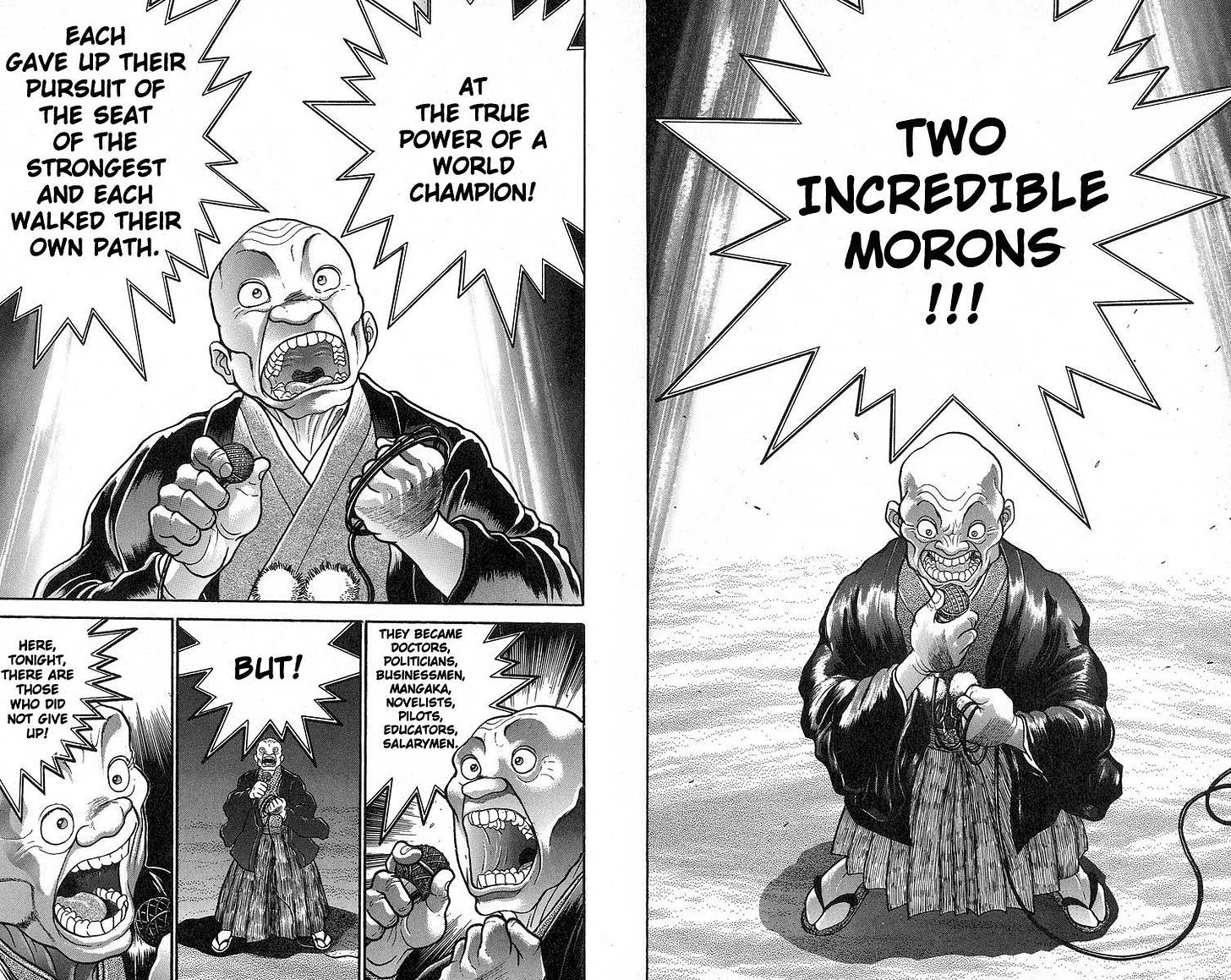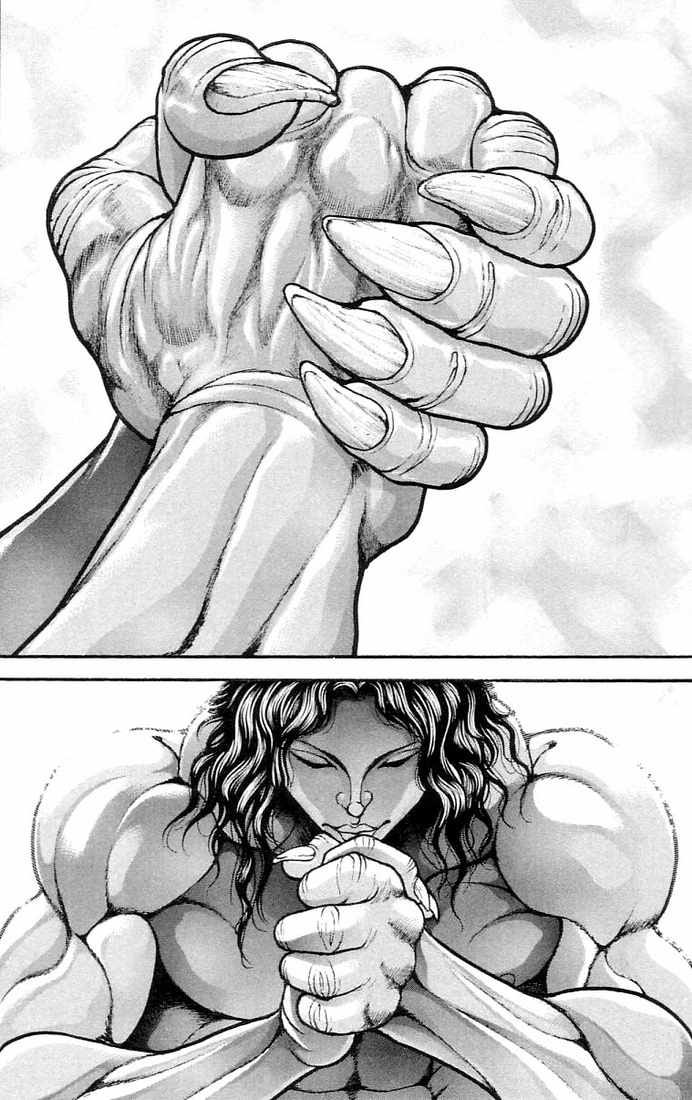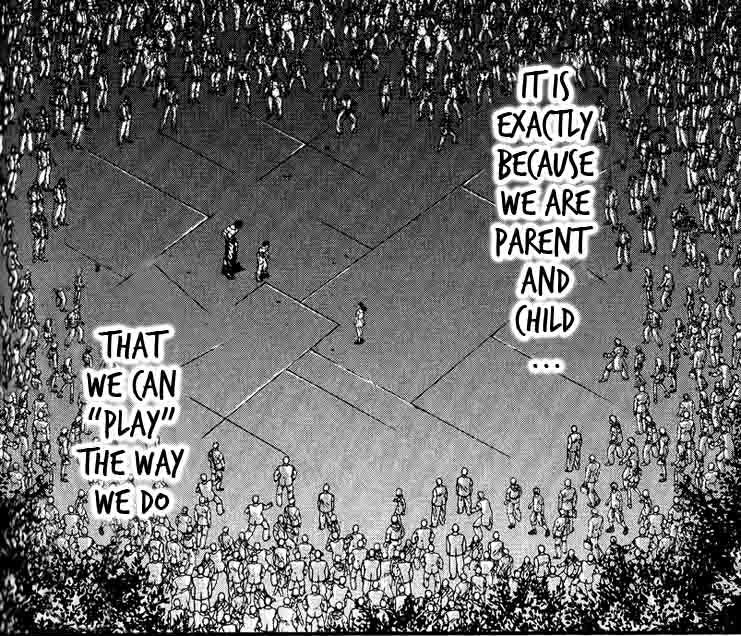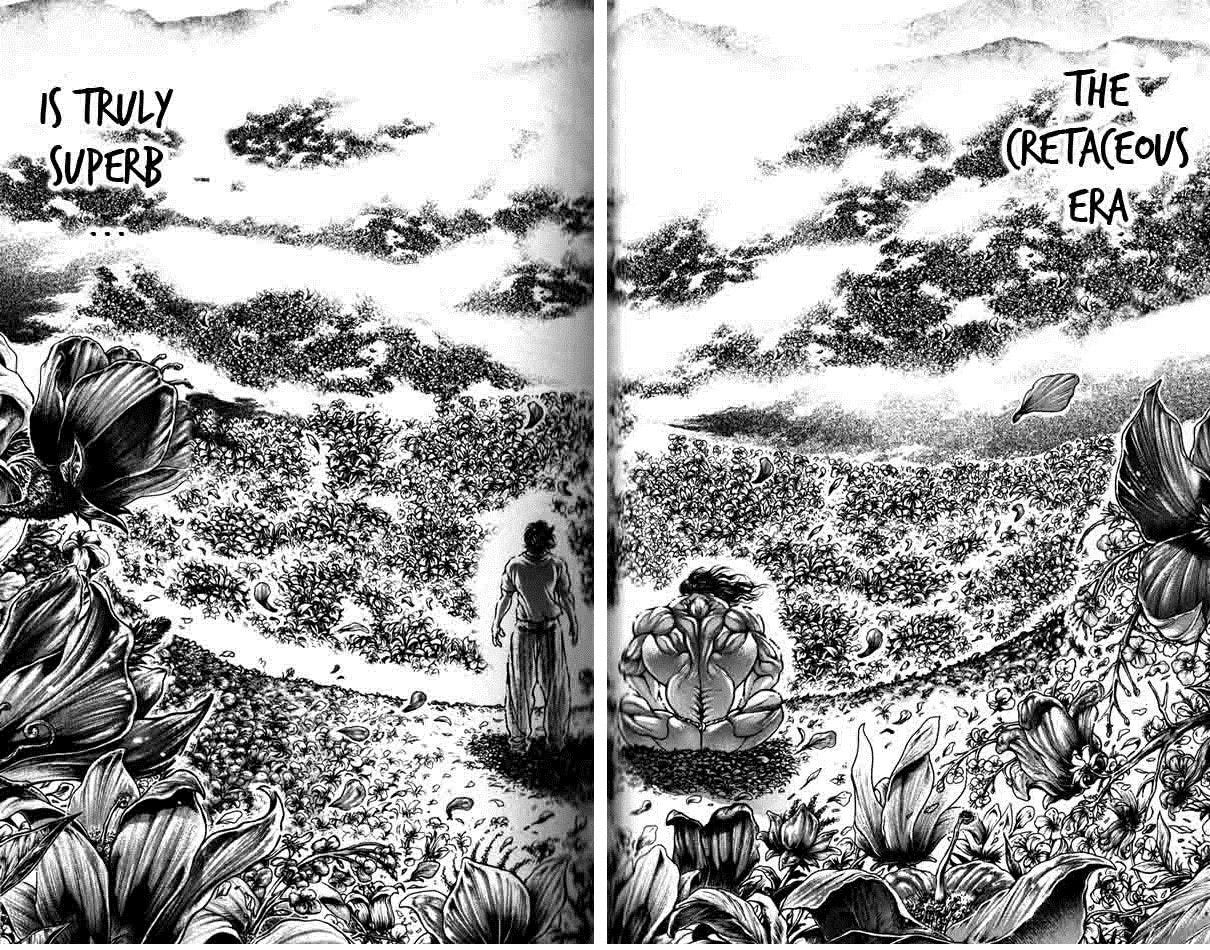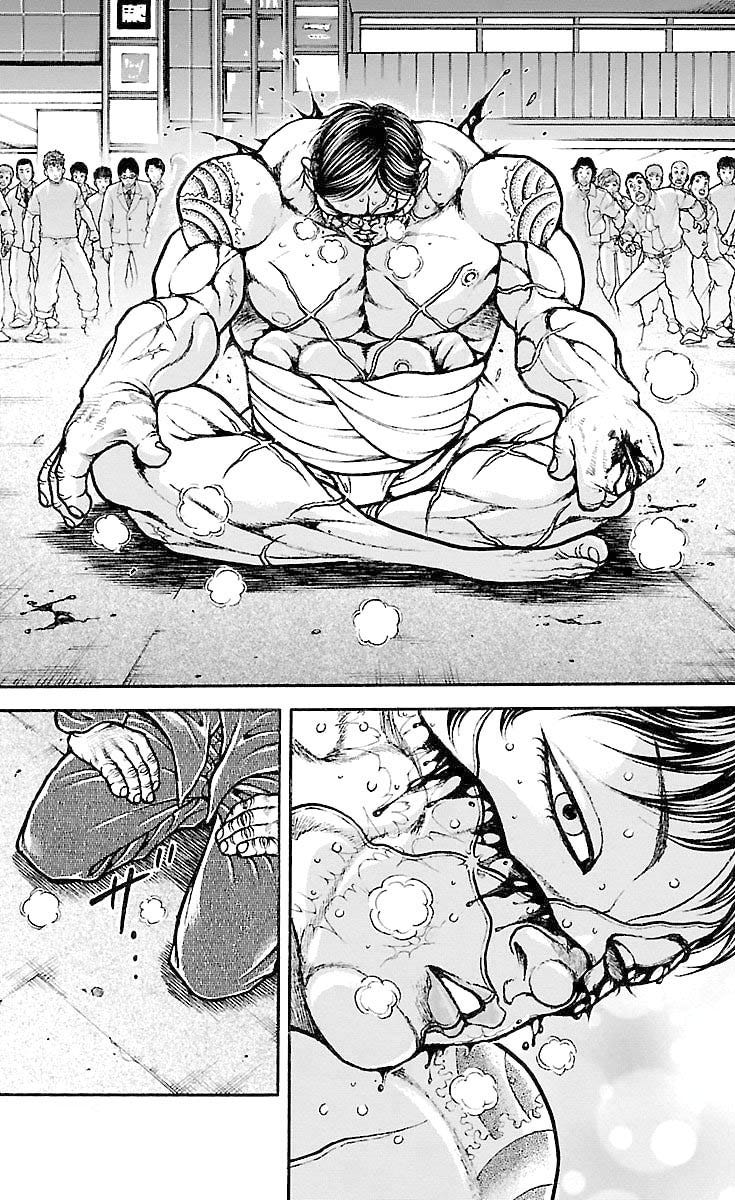The Seriousness of Play in Baki The Grappler, and the Failure of Critique
A love letter to authenticity masculinity, love and sport.
It is often repeated, in articles or in twitter threads, that Baki is about Toxic Masculinity.
Here, I say, that Baki is neither celebratory or toxic about masculinity.
What Baki the Grappler is, is folly. It is play. It is the intersection of where fun, freedom and folly intersect.
A part of a man’s soul, is to be a fool
Tokugawa, often an audience mirror towards the characters, says this:
And that, is why Baki is beautiful.
Plato’s Play And Maturity.
“Contests in skill, strength and perseverance have, as we have shown, always occupied an important place in every culture either in connection with ritual or simply for fun and festivity.”[1]
In the grand tapestry of human existence, Johan Huizinga ties to pull together how we actually weave the damn tapestry. The work I’m talking on is 'Homo Ludens.' It’s a follow up to his previous work but I want to play particular attention to this because a lot of the myths, play and maturity shown in Baki comes from not just folly but the games they play. He posits that play is not merely a pastime but a fundamental aspect of human culture, if not the progenitor of it, intertwined with rituals and deeply ingrained in society. From ancient ceremonies to modern-day games, Huizinga feels out how the entire chain of society comes about: how religion comes about; how politics comes about; yet also how authority out-of-self-love comes about. A judge who wears his wig, gives himself over to the roleplaying game of being a judge. Tokugawa in his old-Japanese outfit takes on the role of match maker, arbiter and gives himself to the arena. All of this is so so important to have a feel for, before I go into why selling Baki into the machine of neoliberal jargon falls hard apart.
When man dances with a costume, when man clasps his hands together; he is performing, he is limiting himself to rules of the game. It is not the Rousseauian man-puts-his-stake-down type of deal but something more primal in play and rules – even a wolf understand territories but it’s the playing and the nibling of ears that lets the alpha or mother teach the pups. From just small games in the “magic circle”: people become entranced; letting hierarchies form; out of the ritual of a game religion forms; and so the metaphysical begins to come close. It is the LARPING of a man pretending to be a spirit, which leads many generations later into culture. This is not to infantilise religion, but recall Huizinga’s definition of play concerning order, and rules. This is the important part here, because play begets culture and so the rich tapestry of myths, symbols, and religious practices, emerges from the fundamental human impulse to engage in play.
And don’t forget, maturity in this sense is when a man reunites his childhood play with his adult responsibilities. Or as Nietzsche said: “is innocence and forgetting, a new beginning, a sport, a self-propelling wheel, a Sacred Yes”[2]
We see this in full effect with Pickle and Katsumi, and it will be the best place to get what I mean. Where we see play and ritual transcend millions of years of history. Huizinga plays with the notions of great knights and dangerous savages, of peasants and kings, but in the game, they are reformed into ritual – and for C.S. Lewis, love. It is not that the noble knights with their tournaments that uncover great love or tragedy that pushes them beyond “primitives” or “savages” as they were indeed still beautiful, still rooted in something sacred is found:
“The effort to stylize love was more than a vain game…Here above all, if men were not to fall into crude barbarism, there was a need to frame emotion within fixed forms.”[3]
So Pickle does the universal gesture, the clasped hands for Katsumi – remember it doesn’t matter if he is directly praying to god, it’s the ritualistic gesture that counts. Through thousands of years, from savagery to nobility to modern times, there’s something still rooted and pure there. Something that comes out in games. That is after all, what fighting essentially is. A role play in the arena. Did Baki not show us this rather literally in his shadow boxing? For fun, festivities or one’s spirit it all comes down to this concept than man creates a game and in the game comes ritual and from that culture. Pickle is brought to terms with the modern world via the ritual and roleplaying of modern life, through the game of fighting. He steps in and understands the nature of the Tokyo Underground arena that has been filled with teeth and piss. Katsumi, in the eyes of Doppo, has transcended into a role beyond “son” or “karateka”. In his work on reviving myth, play and love, Marsilio Ficino believed that, through the medium of sacred play, individuals could transcend the material world and ascend toward spiritual enlightenment, which afterwards affects both Katsumi and Pickle. Katsumi the new dawn of karate, and Pickle at one with Baki and the world on the top of the tower – all this leads to Baki developing the dinosaur stance that catches even his father off guard. A pure transcendence of spirit, unified between three men. Beautiful, meek, pure – love.
Consequently, this all culminates in Son of Ogre’s final fight, where Baki “wins” by forcing Yujiro to role-play, to play with him. We’ll go into that a little later because Yujiro is so often maligned by critics of Baki, that they miss the raw experience and type of myth that he embodies. Which is why I still feel Homo Ludens has its importance, the book was not only a joyful expression of the nature of play and its purpose in discovering humanity; but it was a warning towards the fascism arising in Europe of his time – the death of play, artificially made myth, the slow love replacement into death-desire drives.
Musashi, the fish out of water, comes at a great intersection for the notion of play and culture. Musashi has arrived in a world where play and culture are in an inverted order. Suits, mannerisms and western influences come from a culture instead of play. Musashi finds himself lost and alienated in a world of inversion, buildings built on regulation, instead of fundamentals or playful exploration of structure (As we see with him fighting Pickle). In his reviving, there are questions about the myths, or stories Musashi was a part of and Itagaki subverts what Musashi should say about Sasaki. The people of the modern time, are imposing upon him a role set by culture, when he was from a time of being playful which begat the sword art and legends that came later.
He says this in a roundabout way to Doppo, who shows off his strength and culture, but it’s considered a dance - an insult - because it has lost its “role”; Which Doppo himself had a mini-arc around a man trying to kill a child, and how karate had it’s role fighting against armed opponents in a state of war. When Doppo is not playing this role, karate becomes beholden to the culture of showmanship. Baki’s first ragdolling with Musashi comes from Baki forgetting his own unification of playful childhood spirit and role of a man. The way Musashi sees and understands the various Baki cast, or even Gouki’s reaction are a representation of this divine role, this play they are putting on. It’s visualised quite clearly. Baki as a buffet or Musashi as a natural disaster, there’s a role and instinct they offer, the inner part of a man that they play.
One of the masters of acknowledging this, C.S Lewis, differentiates this violent-pride and image-pride in The Great Sin; ‘diabolical pride’ and what Watson called ‘defensive pride’[4]. The line in which the former is ‘when you look down on others so much that you do not care what they think of you’ and the latter is normally rooted in unconscious wounds of the individual acting out of a proud heart, who they have fantasised as their opponent in some human endeavour. One is a Huizinga’s role-play with a myth and the other is tyrannical, violent and disruptive. Effective violence vs tyrannical violence but in the realm of pride. Hanayama is a prideful yakuza, but Yujiro does not look down upon his challenge. They respect and exchange blows because Hanayama wants his role cemented. There is no tyrant consuming someone on a different tier list, no it’s almost a ritualistic fight. Hanayama has been consistent in this way, with the constant references to the Standing Man myth; he doesn’t fall, he’ll protect his family, his scars are symbols of pride but also of humility that he is after everything only human. You ride pride and sin because when you give yourself to the role you have to maintain your team, your fight and who you are – or in something like the Resetai or Maximum tournament – you are a representative of your school or style.
Remember when Baki was bored? Yawning, because another prideful twat bothered Tokugawa to fight him, and Baki returns to being bored. He needs play, an outlet, a push and tug because it cements him a place in the world. So the feeling of Pickle arriving wakes everyone up because there’s a new magic circle drawn on the ground. A new game. The same happened back when the convicts appeared, they are prideful, cheating and use underground tactics. Retsu’s mirror is a tyrant-Kaioh. Katou, who gets taken in with the pride and abandons his role, gets destroyed and consumed by the tyrant violently. Yet a character in a clown costume – playing a role at the theme park – takes the role of the karatera and gives himself up to it in the face of impossible odds is also worth potentially dying for. For the meek shall inherit the earth, after all.
So there stands Musashi; a challenge for everyone to prove their role or if they are being sincere and not complacent on the culture level. To play a game that stakes everything on there. That’s not say that Retsu failed the prove his role but in the same way Doppo stopped Tokugawa from interfering with Pickle (and the same reason why Tokugawa tranquilised Yujiro in the maximum tournament) that death by this ritual is an honest, true death. It’s an ascension-death. However it reminds every one them of their place in their world, their mortal bodies and their folly. It’s so beautiful that it has to take someone outside of the game (Tokugawa’s Sister] to remove them from the stupor. Not to get too Christian-platonism but Rahner, expanding on Huizinga’s work sees this play as a holy endeavour and it works for Retsu; “humanity’s hope for another life incarnated in gesture”[5] he is given a new life in the Isekai gaiden. I’m being tongue in cheek but Rahner touches upon the sheer beauty in Baki, and what the divine battles against Musashi truly amount too:
“be relieved of all weights that bear [the mind] down, to be free, kingly, unfettered and divine. Man at play is reaching out . . . for that superlative ease, in which even the body, freed from its earthly burden, moves to the effortless measures of a heavenly dance.”[6]
Sport, Competition and the Myth around Yujiro
Myths must exist in a world. While it’s very obvious with Yujiro, and the events of Son of Ogre, this has been engraved throughout Baki since the start, it is to an extent why the manga keeps its prominence. We can all joke about Hanayama’s “Standing Man” myth but it’s real and it is why he keeps standing. The characters feel alive in a world, and not just “activated” when they are in Baki’s orbit because they are playing out an entire world’s cosmic drama. This makes the world of Baki feel alive, interconnected and allows characters to come, change or get scars without being truly beholden to any sort of time-concept. Itagaki himself has said in an interview that he lets the characters live after creating them and in such they become both superhuman while also very human. This explains the “myth” of the characters.
Now myth is also important in this, and it’s also what made sports and competitiveness pretty hard to swallow for many a Christian commentator. C.S Lewis was always struck between the inherently sinful nature of competitive sports, and also the pure power and transcendentalism of sports. It’s hard to separate Augustine's sinful nature from sport; sin, pride, idolatry all comes to the body through sport. Yet Baki does ride that line, and Itagaki weaves within the manga multiple times where these intersect. In the Maximum Tournament, there’s absolutely beautiful visual story telling with Iron Michael vs Mouko Ri – the latter in all his pride and knowledge is punished when the myth of the boxer’s 30cm range is flipped off the wall and into his face. All myth contains a bit of truth – as C.S. Lewis reminds us.
That’s not say that Yujiro “lost” to Baki because of some pride-idolatry context but it’s more than that. It’s something a lot of Christian commentators have lost too. Yujiro lost because he had to play a role, play the father. Baki’s girlfriend, Kozue funnily enough even plays with this, almost as an extension of the reader. She yells at them to fight, instead of play. She wants the shounen climax with the big boss, but Itagaki through her, is laughing at those who say this. They aren’t being misogynistic when they both tell her she doesn’t understand because this play, this father-son play is the most human, real, authentic thing but is only shared between those in the magic circle. I don’t want to end the discussion here because the most important thing that Baki gave him, was more than just playing a father – which Yujiro even recognised in the “playing” page – Baki humanised him.
What I mean by this is that Yujiro has been taken by myth. He has faded into immortality in a sense, when one runs out of categorical desires and eventually becomes bored. For C.S. Lewis, this is a hard line to hold between myth and idolatry because myth contains truth. While he separates this further into true myth / ultimate truth, there’s something in the sports landscape, which John Bale called the ‘mythical landscapes’ but you can get consumed by this and fall to idolatry. Few in Baki talk to Yujiro simply as Yujiro, not the Ogre, not as the myth. Strydum, still strong but on a level far below the main rotation gets a dinner with Yujiro precisely because while he has to play along with the myth, he at least talks back to Yujiro. His arming himself up with the bomb-suit and then turning up to drinks with Yujiro a while later is because both men know he has to play the ritual for the US government, to fluff up both America’s – and the Ogre’s – idolatry and then go back to being human. Strydum really shines in the same way with his attitude towards Pickle, despite everything, he’s going to offer you a fag and hope that maybe the smoke clears the air, in a sense.
Hell, all of this is engrained in the nature of the “underground” arena. The roof over the sumo’s ring is called a yakata, represents the heavens to emphasise the sacred nature of the dohyou which signified the earth. And there, underneath even the dohyou is the sacred underground arena where Yujiro, who has been lost to myth, is not considered for the tournament of the “strongest man on earth” because he is the Ogre, he has the face of spirits in his back muscles. This arena is not for him – this is under the dohyou, under earth. Hanayama, who showed the beauty of the standing man, is not completely lost to myth, if anything that’s why many parts later he fights Yujiro. It’s almost an unconscious way of retaining your humanity, Chiharu goes through this too. I see a lot of dislike for the Chiharu-Baki fight but in it the last remaining barrier; psychology, life and your role are all come to fruition.
In the gaiden, Hana No Chiharu, there is a pun made concerning the title and Ron Shobun. Ron, in explaining his growth from defeat, overwhelms himself with spirit so his body flows faster. He discovers brilliance in the smell of defeat, his pride shattered, reformed and the same mistake not done twice. Everyone in the crowd believes Ron is the bad guy, but it’s beyond that because both men are now showing their “brilliance” (hana but not in the flower sense) their transcendence from their pride. In Middle-Way terms they are both negating their sin, they are cleansing themselves. Chiharu gives up his pride of always being a loser who gets beat but stands, declares that not even the Buddha has the right to tell him to stay down. Ron emblemises the Buddha here, showing brilliance (hana) in his negation of pride and defeat. They’ve both committed to this role-playing game – of bad strong invader and good hometown weak criminal – but mortality doesn’t touch, they’ve gone beyond it.
That’s the thing with Baki, you can get filtered with its art style, sure. Yet, there’s layers underneath it, the motion, the impact, it’s all stylised and sharp. You can call the water ugly but never know it’s depth. You can call the masculinity in it toxic, but those men are an antidote to the conceit.
Socialising Baki Into The Machine
So what’s the point of me explaining this?
The real point of this is actually aimed at the articles that keep popping up, mostly by filler anime sites, about Yujiro or the hypermasculinity of Baki. The sort of over-analysing that I can’t really call anything other than rationalising. Which I suppose I am guilty of here, but there are layers. There is rationalisation, in a sense of the choices one makes – for example to use Saint John Henry Newman who used the term rationalism – means that a man smells a flower field and is taken by its beauty and it brings him closer to God. It’s rational to know that it’s some interplay with scents, the divine and the body to create this sensation. Yet it’s rationalism (which some people say is liberalism) when you say that you are mistaking a social-delusion of religion, for the raw biological processes of “nice scents that attract animals and insects to plants for reproduction “. It’s this social-person thrown on top, the human projected ideas, and no thought for anything other than this ascription. That’s not saying you can’t make arguments for things, but it’s the social assignment that gets me. Socialising something like Baki means cutting off Baki.
For this is all aimed at the same type of people on tumblr who love to write about how the Air Nomads in Avatar: The Last Airbender represent fun, and how fun is the first thing to die in war, but then drop their analysis at that. Nothing past their nose. It is almost ironic that they come close to touching upon the nature of play, but they can only prescribe, outwardly project down from culture onto these character’s roles. You turn the depths into a puddle when you turn it into an attachment to you. It’s love and death, y’know? There’s a fine line between the two. Baki is filled with love and very rare death – and even then the death is treated with pure love. With these people, it’s just personal desire and uncertain unstable death, never anything beyond that. Turns seas to puddles.
Play with me in this space. Nick Land’s “body with wires” a person who believes they are an individual and transcended, but have in fact sold their “organs” to the system, and are now only functional within the system’s constraints. You were supposed to accelerate and schizo-kick flip into robotic black shamanism teraflop catgirls, new sincere roles, better high fidelity games to play in the tech world. What has happened is actually the machines integration is used to amplify human desires. The "wires" symbolize the networks of communication and consumption that facilitate the circulation of desire within capitalist systems. This profile, this individuality then gets to dance about collecting good boy points but it starts to move away from the authentic or sincere – the game is reversed.
Pickle wasn’t “fixed”, he simply matured into his role. In turn, Baki saw Pickle’s sincere world, through nothing but sport.
Baki is poisonous and toxic to most because it cuts through the wires and tries to at least show something more base. Multiple times does Itagaki try to spell it out for you – Musashi complaining about the weakness of modern buildings, or the fragility of a suit – but not in an “old bad, new good” way, but in a “we lose the sense of place, culture and identity in the global, greyed out” sense. Musashi himself starts out looking handsome as the legendary figure, but slowly morphs into an ugly frog over the arc. Itagaki is telling you to your face that making culture from top down is bad and gets worse. Characters are confused when Musashi doesn’t remember what they consider his great duels, because they are imposing on him culture not roles. Any sort of a-priori style turns men into “nice”, sign-value promoting profiles, puppeteering the status quo. Musashi reminded Doppo of this, even though Doppo himself has had to reconcile his outdated role before. It’s all socketed in. The cheerful bowing and celebration at the end of the maximum tournament is all play, it’s a beautiful, wonderful display of game, of sportsmanship of the order that comes from play. Is it toxic masculinity, to enjoy the unification of seriousness and play?
In an article about sport and theology, there was a demonstration of this mentioned from John Eldridge’s book, Wild at Heart: Discovering the Secret of a Man’s Soul which makes a case for authentic masculinity, against a different type of emasculated toxic masculinity. When you take a snippet, you might think it reads like something Katou would’ve written, but it cuts between the masculinity grifters and the Baki-type masculinity quite well. From the idea that most modern Churches often advocate the need for men to be ‘nice’, but it’s not actual niceness. It’s the inversion. It’s appeasement and playing to the system, it’s the puppet with wires on the system in a sense:
“This ‘niceness’ often manifests itself in the form of ‘false humility’ and a superficial and shallow understanding and practice of Christianity. Jesus and his followers are often viewed as ‘weak’ (e.g., needing an emotional crutch) and the teachings they follow (the bible) as a type of ‘fluffy spirituality’ by the modern world. “
Do you remember our Retsu example above? He is introduced as a serious threat, spouting slurs against the Japanese. He’s a credible threat, he has a signature move that is shown to be deadly and catastrophic. What does Baki do, when he learns the Lotus Spin? Baki turns it into play. He smiles and laugh and has fun. Retsu is swept up into Baki’s “play”, and eases off. Continuing on from the quote above: “demonstrating that Christ and to a lesser degree his disciples, although humble, meek and loving, were also ‘masculine’, courageous and willing to die for the Love of God and His work in the world.” It doesn’t have to be God related here, it can be anything beyond one’s self, a real reason underneath. I’ve dropped examples all the way through this article - Hanayama, Chiharu, Doppo etc. Whether it be the discipline of your style, your demon back or even what you lack in Jack’s sense. This is all as important for Baki as it is for Retsu, and sets up that later characters like Dorian (who regresses to a child) must re-mature. This is not to say Retsu is humbled by Baki or de-aged but given humility and play. The maturity, the growth is in the re-establishment of the roles with all the pride cleansed out. Retsu gets to die as a warrior, in the full extent of his role as Kaioh against a force beyond himself, and shows meekness, love and courageous in his death. Death is rare in Baki, and it follows then the one major death is so filled with love.
This is the same warning that Land tried to put out, in between the gibberish, that unites both the cocaine socialist and the peasant in watching Marvel movies. Just as their identities have been placed into the system, so has play – culture gives them signs and virtues and quilting-points. (Aren’t you fed up of Voldemort analogies for evil?) And what did I open up with? That this dehumanisation by way of rationalising is how a system controls its occupants. What happened to Yujiro, will happen to you and your profile. It will happen when you have to stake all of your real-life self into technological sign value girl scout badges. Things get reterritorialized into the system, so you end up with rainbow capitalism because it eats and turns these sincere strivings into desire-badges for your profile. Toxic Masculinity also gets churned up. I do agree it does exist to an extent, and it does hurt men, but men must also find a way themselves to be at ease with it. Throwing the label at something as beautifully transparent as Baki, only serves to sever this and push everything into the system. To socialise it, to over stimulate it, to fill it with desires and sell it back to you. Even if it means overwriting it. You clicked on the article right? You better, ‘cause it will make the writer feel better, and we can all uplift our medium together.
There’s a joke here to be made about the relationship between play and war within the culture wars, that they are both fighting for the control at the wrong end of the magic circle.
The Presidents oath to the Ogre, should remind us that game and roles come before any symbol.
[1] Homo Ludens P.196
[2] Thus Spoke Zarathustra 55
[3] HL. 128
[4] 'Winning at all Costs' in Modern Sport: Reflections on Pride and Humility in
the Writings of C.S. Lewis P.17
[5] Man At Play P.85
[6] MAP P.86




